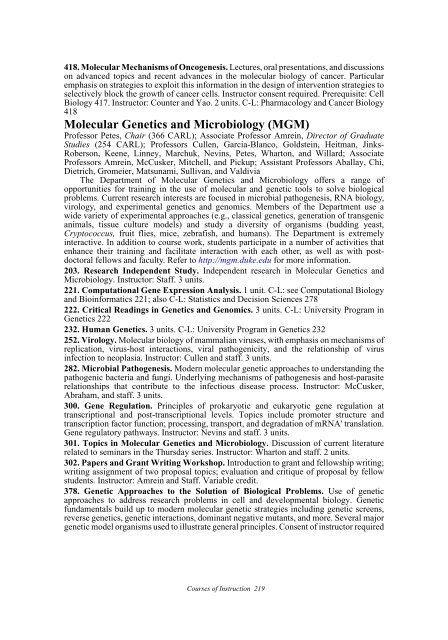Duke University 2008-2009 - Office of the Registrar - Duke University
Duke University 2008-2009 - Office of the Registrar - Duke University
Duke University 2008-2009 - Office of the Registrar - Duke University
You also want an ePaper? Increase the reach of your titles
YUMPU automatically turns print PDFs into web optimized ePapers that Google loves.
418. Molecular Mechanisms <strong>of</strong> Oncogenesis. Lectures, oral presentations, and discussions<br />
on advanced topics and recent advances in <strong>the</strong> molecular biology <strong>of</strong> cancer. Particular<br />
emphasis on strategies to exploit this information in <strong>the</strong> design <strong>of</strong> intervention strategies to<br />
selectively block <strong>the</strong> growth <strong>of</strong> cancer cells. Instructor consent required. Prerequisite: Cell<br />
Biology 417. Instructor: Counter and Yao. 2 units. C-L: Pharmacology and Cancer Biology<br />
418<br />
Molecular Genetics and Microbiology (MGM)<br />
Pr<strong>of</strong>essor Petes, Chair (366 CARL); Associate Pr<strong>of</strong>essor Amrein, Director <strong>of</strong> Graduate<br />
Studies (254 CARL); Pr<strong>of</strong>essors Cullen, Garcia-Blanco, Goldstein, Heitman, Jinks-<br />
Roberson, Keene, Linney, Marchuk, Nevins, Petes, Wharton, and Willard; Associate<br />
Pr<strong>of</strong>essors Amrein, McCusker, Mitchell, and Pickup; Assistant Pr<strong>of</strong>essors Aballay, Chi,<br />
Dietrich, Gromeier, Matsunami, Sullivan, and Valdivia<br />
The Department <strong>of</strong> Molecular Genetics and Microbiology <strong>of</strong>fers a range <strong>of</strong><br />
opportunities for training in <strong>the</strong> use <strong>of</strong> molecular and genetic tools to solve biological<br />
problems. Current research interests are focused in microbial pathogenesis, RNA biology,<br />
virology, and experimental genetics and genomics. Members <strong>of</strong> <strong>the</strong> Department use a<br />
wide variety <strong>of</strong> experimental approaches (e.g., classical genetics, generation <strong>of</strong> transgenic<br />
animals, tissue culture models) and study a diversity <strong>of</strong> organisms (budding yeast,<br />
Cryptococcus, fruit flies, mice, zebrafish, and humans). The Department is extremely<br />
interactive. In addition to course work, students participate in a number <strong>of</strong> activities that<br />
enhance <strong>the</strong>ir training and facilitate interaction with each o<strong>the</strong>r, as well as with postdoctoral<br />
fellows and faculty. Refer to http://mgm.duke.edu for more information.<br />
203. Research Independent Study. Independent research in Molecular Genetics and<br />
Microbiology. Instructor: Staff. 3 units.<br />
221. Computational Gene Expression Analysis. 1 unit. C-L: see Computational Biology<br />
and Bioinformatics 221; also C-L: Statistics and Decision Sciences 278<br />
222. Critical Readings in Genetics and Genomics. 3 units. C-L: <strong>University</strong> Program in<br />
Genetics 222<br />
232. Human Genetics. 3 units. C-L: <strong>University</strong> Program in Genetics 232<br />
252. Virology. Molecular biology <strong>of</strong> mammalian viruses, with emphasis on mechanisms <strong>of</strong><br />
replication, virus-host interactions, viral pathogenicity, and <strong>the</strong> relationship <strong>of</strong> virus<br />
infection to neoplasia. Instructor: Cullen and staff. 3 units.<br />
282. Microbial Pathogenesis. Modern molecular genetic approaches to understanding <strong>the</strong><br />
pathogenic bacteria and fungi. Underlying mechanisms <strong>of</strong> pathogenesis and host-parasite<br />
relationships that contribute to <strong>the</strong> infectious disease process. Instructor: McCusker,<br />
Abraham, and staff. 3 units.<br />
300. Gene Regulation. Principles <strong>of</strong> prokaryotic and eukaryotic gene regulation at<br />
transcriptional and post-transcriptional levels. Topics include promoter structure and<br />
transcription factor function; processing, transport, and degradation <strong>of</strong> mRNA' translation.<br />
Gene regulatory pathways. Instructor: Nevins and staff. 3 units.<br />
301. Topics in Molecular Genetics and Microbiology. Discussion <strong>of</strong> current literature<br />
related to seminars in <strong>the</strong> Thursday series. Instructor: Wharton and staff. 2 units.<br />
302. Papers and Grant Writing Workshop. Introduction to grant and fellowship writing;<br />
writing assignment <strong>of</strong> two proposal topics; evaluation and critique <strong>of</strong> proposal by fellow<br />
students. Instructor: Amrein and Staff. Variable credit.<br />
378. Genetic Approaches to <strong>the</strong> Solution <strong>of</strong> Biological Problems. Use <strong>of</strong> genetic<br />
approaches to address research problems in cell and developmental biology. Genetic<br />
fundamentals build up to modern molecular genetic strategies including genetic screens,<br />
reverse genetics, genetic interactions, dominant negative mutants, and more. Several major<br />
genetic model organisms used to illustrate general principles. Consent <strong>of</strong> instructor required<br />
Courses <strong>of</strong> Instruction 219









